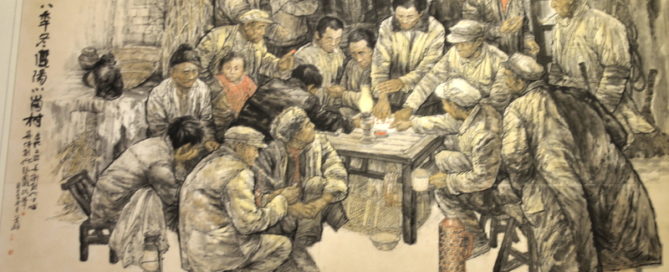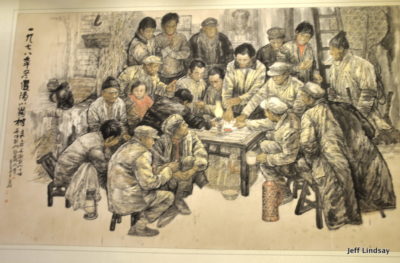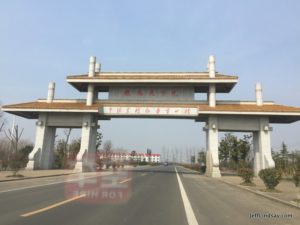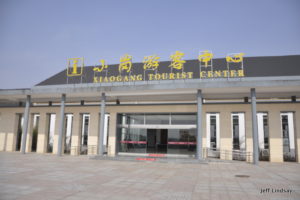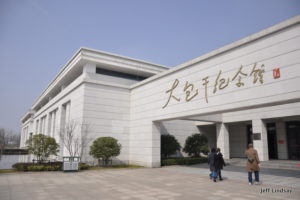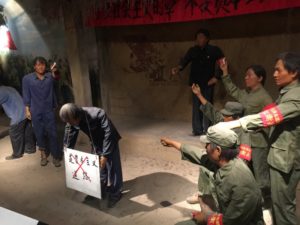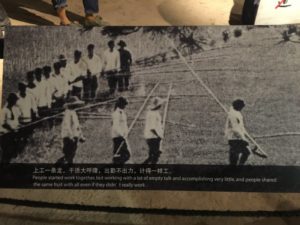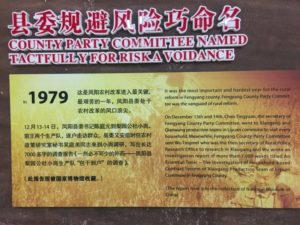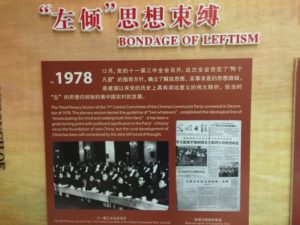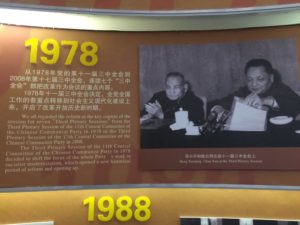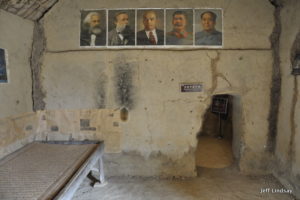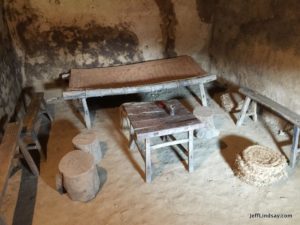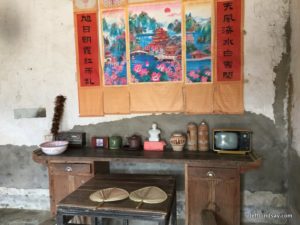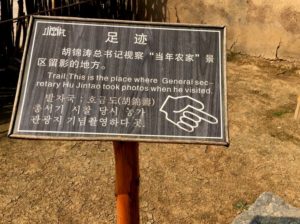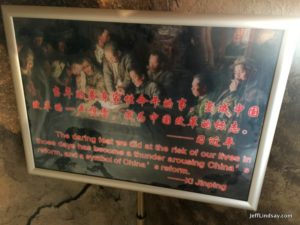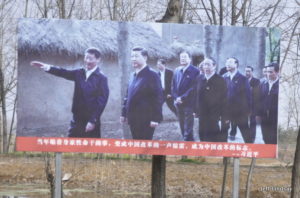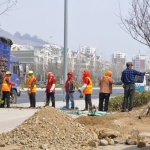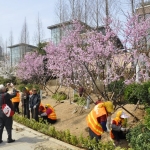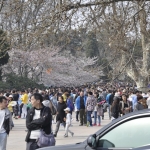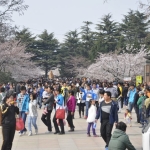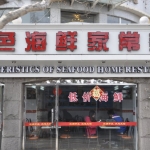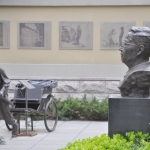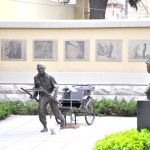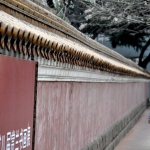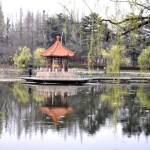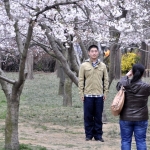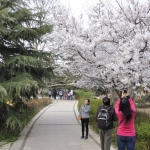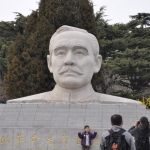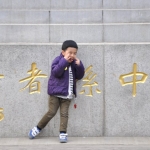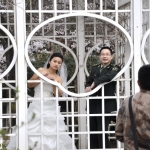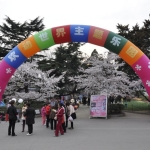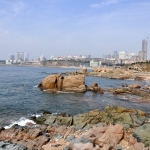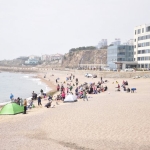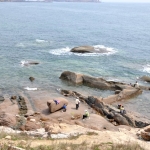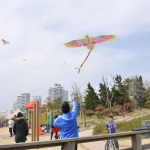Xiaogang, Anhui: Can You Hear the Roar of Prosperity from China’s Quiet Revolution?
One of the most touching and courageous moments in China’s recent history is depicted in the painting shown here of a secret meeting of farmers in a tiny village that few people have ever seen or heard of. It was the beginning of a quiet revolution, what one might call China’s Second Revolution, whose roar continues to inspire and strengthen this land. These farmers are gathered in a hut in a dark side room free of windows to keep the meeting hidden from spies. As the mostly illiterate farmers touched the red ink pad to sign an illegal contract with their fingerprints, they were putting more than ink onto paper: they were putting their lives on the line. That moment in 1978 marks the birth of a revolution that has changed the world and blessed hundreds of millions in this land. It’s a story rich in basic lessons that the West may need to relearn in order to survive.
The village is called Xiaogang (pronounced like “Shau Gong”). It’s a tiny dot on the map in Anhui Province about an hour away from the major city of Bengbu, a city most Westerners have never heard of because, of course, it only has the population of Chicago. But Xiaogang Village is really small, I’d guess around a thousand people or less, and that’s counting the outsiders who work here to staff their gargantuan tourist buildings that commemorate the economic revolution that began here. After learning about the dramatic but not frequently shared story, I finally made a pilgrimage in 2017 to what is now a sacred spot.
The story basically is that the village of Xiaogang had been suffering from the effects of the Great Leap Forward and then the Cultural Revolution, along with some bad weather, perhaps. The old system of that day left people with relatively little incentive to work hard and produce more. They were starving. Whether they worked hard all day or just slept, they would still get inadequate food and risk starvation. Why bother? But they suspected there was a better way. Led by a brave man, the farmers met and agreed to implement a bold new (but actually very ancient) system. The contract they signed agreed to give a portion to the government and then they would get to keep the surplus for themselves. In the article “Xiaogang, Anhui,” Wikipedia describes the Xiaogang miracle this way:
During the Great Leap Forward, Fengyang County, along with much of the rest of the country, experienced a period of famine. A quarter of the county’s population, 90,000 people, died of starvation. In Xiaogang village alone, 67 villagers died of starvation out of a population of 120 between 1958 and 1960.
In December 1978, eighteen of the local farmers, led by Yan (NPR’s name is a typo, there is no YEN in Chinese romanization) Jingchang,[2] met in the largest house in the village. They agreed to break the law at the time by signing a secret agreement to divide the land, local People’s Commune, into family plots. Each plot was to be worked by an individual family who would turn over some of what they grew to the government and the collective whilst at the same time agreeing that they could keep the surplus for themselves. The villagers also agreed that should one of them be caught and sentenced to death that the other villagers would raise their children until they were eighteen years old.[2][3] At the time, the villagers were worried that another famine might strike the village after a particularly bad harvest and more people might die of hunger.
After this secret reform, Xiaogang village produced a harvest that was larger than the previous five years combined.[2] Per capita income in the village increase from 22 yuan to 400 yuan with grain output increasing to 90,000Â kg in 1979.[3] This attracted significant attention from surrounding villages and before long the government in Beijing had found out. The villagers were fortunate in that at the time China had just changed leadership after Mao Zedong had died. The new leadership under Deng Xiaoping was looking for ways to reform China’s economy and the discovery of Xiaogang’s innovation was held up as a model to other villages across the country. This led to the abandonment of collectivised farming across China and a large increase in agricultural production. The secret signing of the contract in Xiaogang is widely regarded as the beginning of the period of rapid economic growth and industrialisation that mainland China has experienced in the thirty years since.
This is dramatic stuff, and it’s been recognized by the Chinese government as a key moment in China’s history. Wonderfully, Deng Xiaoping embraced the Xiaogang miracle, which was vital inspiration for the economic reforms he introduced. The timing was just right, and as a result, when local police came knocking on the door of the main farmer behind the conspiracy, it was not to take him to his death as he expected, but to ask for help in expanding their illegal system across many more farms in China. He came away from the police station as hero, not as a criminal, and China awoke to a revolution that continues to roar. Some of you will call that capitalism and an abandonment of Chinese socialism, but over here I think it’s more officially viewed as an important modification in socialism, part of the unique Chinese approach, that overcomes empty “bubble talk” and lack of commitment to work that many faced. However you want to package it, it was a huge step for China. I have seen the burden of poverty in this country and yearn for China’s economic success, and applaud the brave farmers who started the revolution and the policy makers who recognized and learned from their wisdom. What a revolution it has been.
I hope you’ll consider a trek to Xiaogang someday. (I might even join you if you give me advance notice.)
Getting there wasn’t too difficult from Shanghai. It required two or so hours in a high-speed train, often reaching 300 km/hr, to reach Bengbu, and then about an hour in a taxi to reach the village. The town is pretty much just one side road on the main highway. But it has a big arch as you enter, and then a giant tourist center, and then you find that the tourist center is not about the historical event that should make this town famous, but about its current geography, agriculture, climate, etc. Not what IO came for, but nice to have, I suppose.
Only after inquiring did we learn that the place celebrating the key historical event is on an even bigger building about one kilometer down the only side road off the main highway the the town seems to have.
When my wife and I with two other Western friends finally arrived at the primary building about the Xiaogang miracle, I was amazed at how large it was. And what a thrill to finally be there! But where were all the crowds? The place was obviously built with the expectation of big tour groups, but it seemed rather vacant on the Saturday when we showed up. Never mind, I was so excited to finally be here.
As we entered and paid a small fee, it was about 11:50 AM, and the staff informed us that it would be lunch in 10 minutes and we would have to leave until lunch was over at 1:30 PM. Since we had a 3 PM train to Nanjing for additional plans and would need to leave by 2 PM, waiting until 1:30 would be a huge set back. I politely pleaded our case: “We are foreigners who have traveled a long way to see this vitally important site in Chinese history. We have looked forward to this for so long and now are here on a tight schedule. We have to go to Nanjing this afternoon and would not be able to see all the museum if we wait until 1:30. We won’t cause any trouble and don’t need any help. Can we please just stay and look around during your lunch? Please?” No, sorry, we are closed at noon. Come back at 1:30. We didn’t get anywhere with diplomacy, so we rushed in and started looking and shooting photos. A friend suggested we just stay and keep looking. But soon a staff member came to escort us out and right at 12:00 the lights went out. China has made huge progress in customer service attitudes during my six years here, but sometimes there is still room for progress. Tourist sites that close in the middle of a Saturday for lunch (or naps) represent an opportunity for progress, IMHO.
The memorial had some frank information though it was very tactfully presented and balanced with reminders of the positive impact of officials over the years that greatly cheered and motivated the workers. But repeatedly we can see hints about the excesses of the Cultural Revolution. The scene below from the museum is of a landowner being harassed for having taken the “capitalist road.” Those scenes could be very tragic.
During our 10 minute spree through the building, we realized it was just a museum and didn’t look like it housed the site where the economic revolution began. On our way out, though, we asked some more questions. “Oh, you want to see the old hut? It’s just down the street, about 200 meters, and it’s open during lunch.” Ah hah! Glad we didn’t spend all our time in the museum to miss the most important site. There was the hut where it all began, and the side room with the table where the contract was signed. We sat there and put our fingers to the pad and thought of the brave farmers, tired of watching loved ones die of starvation, risking their lives for the right to keep a reasonable chunk of what they produce. Economics 101, but forgotten by too many in our world.
The result of the conspiracy was a sudden boom in prosperity. About a 600% increase! It went viral and lifted one of the poorest parts of China. Farmers rose out of poverty and could afford luxuries like a television, a ceiling fan, and a sewing machine.
The leader of China today, Xi Jinping, paid tribute to Xiaogong with a 2016 visit. Of that moment in history and of those brave farmers, he said this:
“The daring feet that we did at the risk of our lives in those days has become a thunder arousing China’s reform, and a symbol of China’s reform.”Â
Whatever you think about the politics of China and the revolution that gave us the nation of China, I think all of us Westerners can embrace and learn from this second revolution of China that has lifted so many of its people and brought so much opportunity and hope. At this time of thanksgiving, the courage of those who brought about the Xiaogang miracle is one of the things that I am grateful for. And how grateful I am that I could visit that site and meet some of the locals of Xiaogang. Sadly, I was the first foreigner they had seen there for months, one worker told me. Wish more of you would come by and experience the spirit of this place.

